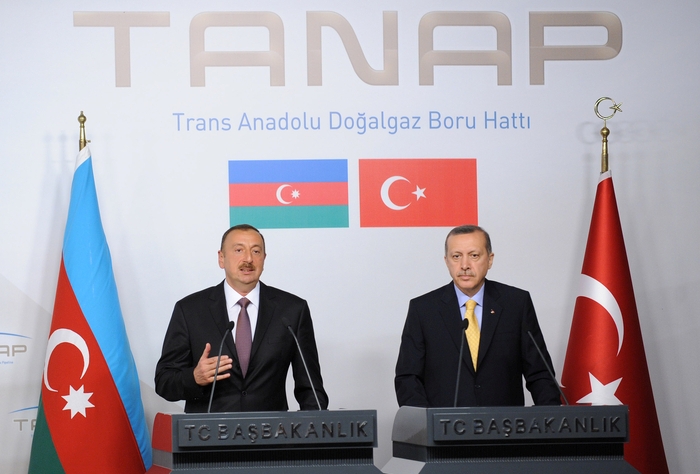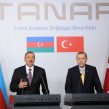
Azerbaijan-Europe Gas Transportation Consortiums Face Major Restructuring
Publication: Eurasia Daily Monitor Volume: 9 Issue: 148
By:

The Trans-Anatolia Pipeline (TANAP) project, initiated by Azerbaijan with Turkey, is the first real boost to the EU-backed Southern Corridor for Caspian gas to Europe. Planned to carry Azerbaijani (and, in due course, also Turkmenistani) gas, TANAP has resurrected the Corridor’s centerpiece, the Nabucco pipeline project, from a quasi-moribund status, to that of an indispensable continuation of the TANAP route into Central Europe, as the shorter Nabucco-West. Competing against Nabucco, a trans-Adriatic pipeline project seeks to divert the Caspian gas flow from TANAP toward Italy.
With TANAP planned to run from the Georgia-Turkey border to the Turkey-EU border (in effect, replacing the old version of Nabucco across Turkey), a decision is pending about the onward pipeline route to European consumer countries. That decision is up to the gas producers’ consortium at Azerbaijan’s Shah Deniz field development, the main supply source for the planned TANAP pipeline and any continuation into Europe.
The TANAP initiative, and the process of selecting the onward route into Europe, are now repositioning the many interested parties and recasting the composition of pipeline consortiums. Since the June 26 signing of the Azerbaijan-Turkey agreement (see EDM, June 27, 29), practically all parties find they must in one way or another accommodate Azerbaijan’s TANAP initiative.
The Shah Deniz producers’ consortium includes British Petroleum (BP, technical operator of this project) and Norway’s Statoil with stakes of 25.5 percent each; Azerbaijan’s State Oil Company (SOCAR), Total of France, LukAgip (joint venture of Russian Lukoil with Italian ENI’s Agip subsidiary), and Naftiran Intertrade (subsidiary of the National Iranian Oil Company – NICO) with 10 percent each; and Turkish Petroleum with 9 percent. This composition is identical with that of the existing pipeline from Azerbaijan to the Georgia-Turkey border (South Caucasus Pipeline, also known as Baku-Tbilisi-Erzurum pipeline), the connecting link with TANAP. The Shah Deniz producers’ consortium has declared the Iranian shareholder company ineligible for participating in TANAP or in any other gas transportation projects to Europe (Trend, August 2).
TANAP’s founding stakeholders are Azerbaijan’s State Oil Company with 80 percent and Turkey with 20 percent (split between the Botas state pipeline operator and Turkish Petroleum). From the outset, Baku announced that it would sell portions from its TANAP majority stake to some of the gas producing companies active in Azerbaijan, meaning primarily BP, presumably also Total and potentially others. However, Azerbaijan would retain a majority of shares and operating rights in the project. BP is interested in joining the project, preferably with a significant stake, and at least as a means to take part in decision-making, rather than being left out altogether. BP had, until recently, favored using Turkey’s state-owned pipelines for exporting limited gas volumes from Shah Deniz; but Baku came up with the TANAP project to build a new pipeline for big volumes of Caspian gas. BP is now adjusting to this.
According to President Ilham Aliyev, “companies that have long been in Azerbaijan and are friendly to us can participate in this [TANAP] project as shareholders and investors. But, of course, we will determine which companies can participate in this project” (Interfax, July 12). Meanwhile, Azerbaijan’s State Oil Fund has announced that it considers the possibility of joining TANAP as one of the co-investors (Trend, July 23).
Nabucco’s shareholders are Austrian OMV, German RWE, Hungarian FGSZ (Natural Gas Transmission subsidiary of MOL), Romanian Transgaz, the Bulgarian Energy Holding and Turkey’s Botas, with equal stakes of 16.67 percent each. The absence of a major (“champion”) gas-producing company was a weakness of the Nabucco project all along. This is about to change, however. Already in May, anticipating the signing of the Azerbaijan-Turkey TANAP agreement, the Nabucco project company suggested a negotiated entry of some Shah Deniz producer companies into Nabucco’s abridged version, Nabucco-West.
BP has become the first among Shah Deniz producers to announce its intention to join the Nabucco consortium. The consortium has also made overtures to Azerbaijan’s State Oil Company for possible entry into the Nabucco-West project. Logically along the same lines, the Nabucco project company has proposed in Baku to start talks about connecting Nabucco-West with TANAP (Trend, July 3; Dow Jones, July 19; APA [Azerbaijani Press Agency], July 23; Wirtschaftsblatt, July 27).
Thus, the Nabucco consortium seems to be up for significant restructuring. This would redistribute decision-making powers in favor of gas suppliers, new entrants into the pipeline project. By the same token it would substantially increase a reformed consortium’s capacity to finance construction of the Nabucco-West pipeline, which the project’s existing shareholders cannot do on their own.
The producers’ entry into Nabucco-West could strongly incentivize the Shah Deniz consortium to select this route, from Bulgaria to Vienna with a link to Germany, as against the rival trans-Adriatic pipeline (TAP) project in the direction of Italy. The TAP consortium includes Norway’s Statoil and Swiss Elektrizitaetsgesellschaft Laufenburg (EGL) with stakes of 42.5 percent each, and German E.On Ruhrgas with 15 percent. Thus, the TAP consortium has had one of the major Shah Deniz producers, Statoil, among TAP shareholders all along. Statoil has a vested interest in TAP and is advocating for TAP in Brussels. This would place Statoil in a perceived conflict-of-interest situation when the Shah Deniz consortium decides whether to select Nabucco-West or TAP as the European export route for its gas.
But BP also intends to join TAP, as a stakeholder in that project. According to BP Vice President, Al Cook (overseeing the Shah Deniz project), BP proposes to take stakes in both rival projects, Nabucco-West and TAP; to treat them equally, comparing their respective costs, risks, and market potentials, and on that basis select one of these pipeline routes. BP had first signaled an interest in joining the TAP project. But Azerbaijan State Oil Company’s president, Rovnag Abdullayev, cautioned that BP would need to coordinate any such move with other Shah Deniz consortium members, so as to avoid a conflict-of-interest situation if it joins TAP only (Bloomberg, July 4; Dow Jones, July 19).
The TAP project company seems willing to jump aboard TANAP, connecting the planned TAP pipeline with TANAP near the Turkey-Greece border (competing against Nabucco-West’s connection with TANAP at the Turkey-Bulgaria border). But TAP declares an equal interest in using Botas pipelines in Turkey and the Inteconnector Turkey-Greece (ITG), instead of TANAP, for accessing Azerbaijani gas. TAP pursues these two options as “and/or” options, according to the project company’s latest presentation (Trend, July 24, 27).
These suggestions seem designed, first, as a minor incentive for a reluctant Greece to cooperate in a project on Greek territory without Greece being a stakeholder in it. But more significantly, TAP’s Botas option seems designed to appeal to BP. Until recently, BP was proposing to use Botas pipelines for limited exports of Azerbaijani gas to Europe, instead of building a new pipeline of strategic significance, be that Nabucco or indeed TANAP. Apparently, TAP’s Botas option stems from calculations that BP remains unenthusiastic about TANAP.




